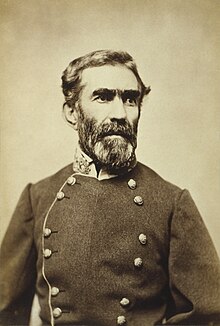Braxton Bragg
Braxton Bragg (born March 22, 1817 in Warrenton in Warren County , North Carolina , † September 27, 1876 in Galveston , Texas ) was an officer in the US Army , General of the Confederate Army and worked in the administration of various states and cities after the Civil War .
Origin and career
Bragg was the son of trained carpenter and building contractor Thomas and his wife Margaret (Crossland) Bragg. After attending Warrenton Academy , he was trained at the Military Academy in West Point , New York , which he graduated from in 1837 as the fifth-best of his year in a class of 50 graduates. He was a teetotaler and married Eliza Brooks Ellis on June 7, 1849.
Military career
After his graduation he was accepted as a lieutenant in the artillery force and 1837-1838 stationed in Fort Monroe , Virginia . From 1838 to 1845 he served as a first lieutenant in the Indian Wars . During the Mexican-American War , he excelled in the defense of Fort Brown ( certification promotion to captain ), Monterrey (certification promotion to major ) and Buena Vista (certification promotion to lieutenant colonel ) from. He was then stationed in the Jefferson Barracks in St. Louis , Missouri from 1849 until he left the army in 1856 . He ran a sugar cane plantation near Thibodaux, Lafourche Parish , Louisiana . From 1859 to 1861 he was a public works commissioner in the Second District of Louisiana.
Secession period
After the Civil War began , Bragg joined the Confederate Army as Brigadier General and was given command of the Confederate Forces in Pensacola , Florida in mid-1861 . On September 12, 1861, he was promoted to major general. From January 1862, Bragg commanded the military district of Alabama and western Florida. In the Battle of Shiloh he commanded the II Corps . After the death of General Albert Sidney Johnston at Shiloh, he was promoted to general . After the Battle of Corinth , he replaced General PGT Beauregard as Commander in Chief of the Tennessee Army . Bragg planned the invasion of Kentucky in mid-1862. After an initial success at Munfordville, his intention to take the initiative failed. After the Battle of Perryville on October 8, 1862, he evaded to Knoxville , Tennessee .
In Tennessee he was defeated by William Starke Rosecrans at Murfreesboro (December 31, 1862-2 January 1863), but defeated him on Chickamauga (September 18-20 , 1863). Bragg besieged the defeated Cumberland Army in Chattanooga , Tennessee without attacking them and was defeated in the Battle of Chattanooga (November 23-25, 1863) and, among other things, relieved. He was succeeded by Joseph E. Johnston . Bragg, who was a close friend of Jefferson Davis and constantly quarreled with his subordinates, was transferred to Richmond , Virginia in February 1864 . He succeeded Robert Edward Lee in the vacant post as military adviser to the President. However, his influence here was limited, as the two most important armies of the Confederation directly demanded the decisions of the president. In November of the same year Bragg was given command in Wilmington , North Carolina and was involved in the Battle of Bentonville , North Carolina in March 1865. He served President Davis during his escape to Georgia and was captured with the President on May 10, 1865.
post war period
After the war, he became a civil engineer in New Orleans , Louisiana and later a port facility inspector in Mobile , Alabama . During the 1870s, he served as the public works officer for the state of Alabama and as the chief engineer for the Gulf, Colorado, & Santa Fe Railroad . He moved to Galveston, Texas and stayed in the railroad business there. Bragg died on September 27, 1876 and was buried in Magnolia Cemetery in Mobile, Alabama.
Others
He was the younger brother of Thomas Bragg , the temporary Confederate Justice Minister.
Namesake
- Bragg was namesake z. B. the present Fort Bragg military base , North Carolina.
- Fort Bragg , California is named after him.
- Bragg, a ghost town also known as Bragg Station, is named after him. The location is in Hardin County, Texas .
literature
- Grady McWhiney: Braxton Bragg and Confederate Defeat . Volume 1. 1969, ND Tuscaloosa, AL 1991.
- Judith L. Hallock: Braxton Bragg and Confederate Defeat . Volume 2. Tuscaloosa, AL 1991.
Web links
- Braxton Bragg in the database of Find a Grave (English)
Individual evidence
| personal data | |
|---|---|
| SURNAME | Bragg, Braxton |
| BRIEF DESCRIPTION | General of the Confederate States of America |
| DATE OF BIRTH | March 22, 1817 |
| PLACE OF BIRTH | Warrenton , Warren County , North Carolina |
| DATE OF DEATH | September 27, 1876 |
| Place of death | Galveston , Texas |
